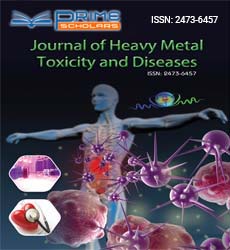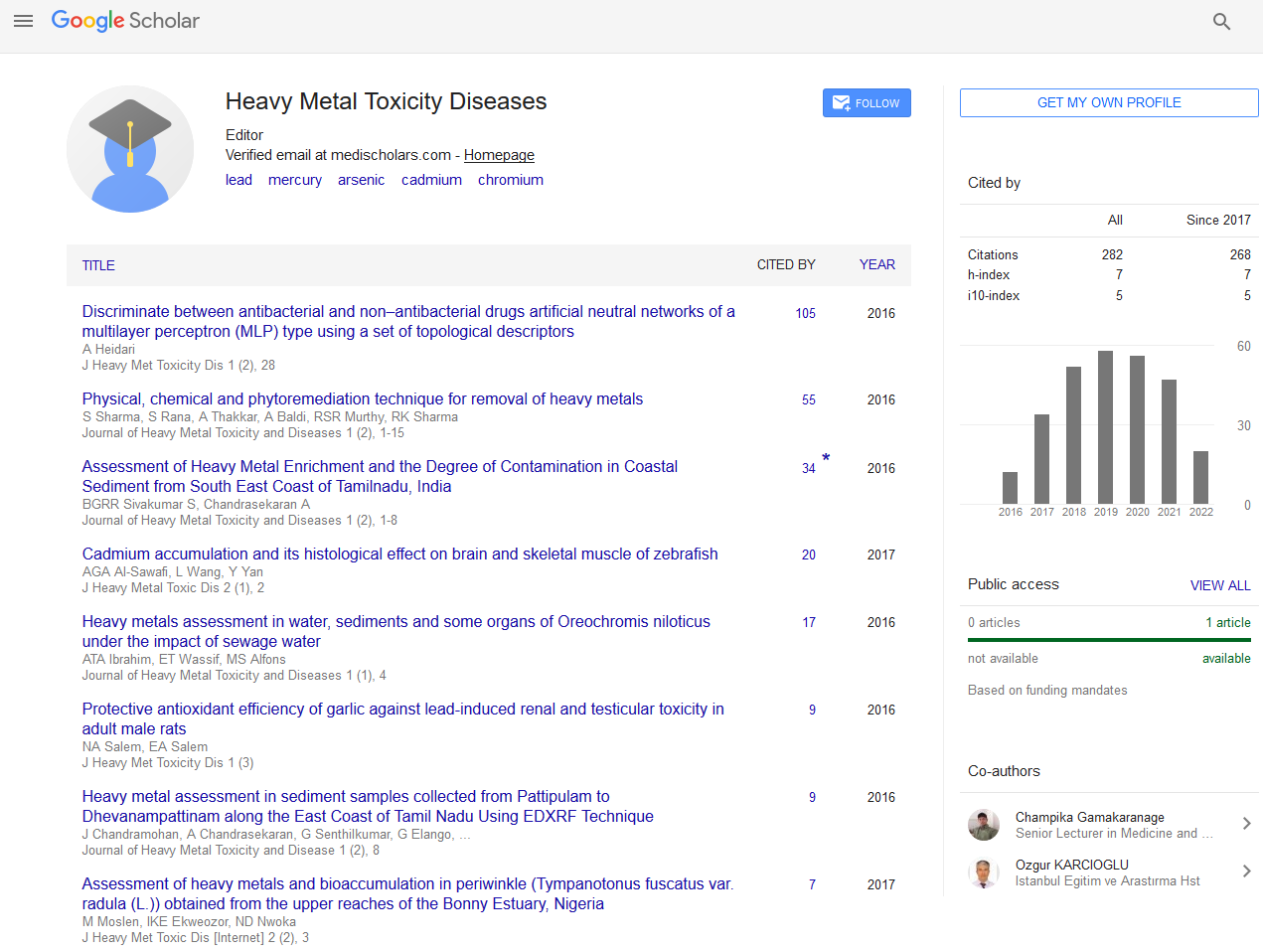Commentary - (2024) Volume 9, Issue 6
From Exposure to Disruption: The Role of Heavy Metals in Endocrine Health
Cito Belc*
Department of Life Science, Munich University, Germany
*Correspondence:
Cito Belc,
Department of Life Science, Munich University,
Germany,
Email:
Received: 02-Dec-2024, Manuscript No. ipjhmct-24-22062;
Editor assigned: 04-Dec-2024, Pre QC No. ipjhmct-24-22062 (PQ);
Reviewed: 18-Dec-2024, QC No. ipjhmct-24-22062;
Revised: 23-Dec-2024, Manuscript No. ipjhmct-24-22062 (R);
Published:
30-Dec-2024, DOI: 10.21767/2473-6457.24.6.60
Description
Heavy metals, such as lead, mercury, arsenic, cadmium, and
others, are a group of toxic elements that are harmful to
human health. These metals are found in various environmental
sources, including polluted air, contaminated water, industrial
emissions, and agricultural chemicals. While their toxicity is
well-documented in relation to different organ systems, recent
research has raised increasing concern about their impact on
the endocrine system. The endocrine system is responsible
for regulating hormones that control numerous physiological
processes, including growth, metabolism, reproduction, and
immune response. Disruptions to this delicate balance can result
in various health problems, including developmental disorders,
fertility issues, metabolic disturbances, and cancer. This article
explores the effects of heavy metals on the endocrine system
and the potential health consequences of prolonged exposure.
The endocrine system operates through glands that release
hormones into the bloodstream, which then travel to target
organs and tissues. The major glands involved include the
thyroid, adrenal glands, pancreas, gonads and pituitary gland.
Heavy metals can interfere with the function of these glands
by disrupting hormone production, secretion, and receptor
signaling. One of the primary ways in which heavy metals affect
the endocrine system is by mimicking or blocking the actions
of natural hormones. For example, metals like cadmium and
lead can bind to hormone receptors, disrupting their normal
function. Additionally, heavy metals can alter the enzymes that
are responsible for synthesizing or metabolizing hormones.
These disruptions can lead to abnormal hormone levels, which
in turn can interfere with bodily processes such as metabolism,
reproduction, and growth. The thyroid gland plays a crucial role
in regulating metabolism, energy production, and growth by
releasing thyroid hormones. Heavy metals, particularly mercury
and lead, can interfere with thyroid function. Mercury has been
shown to inhibit the activity of thyroid peroxidase, an enzyme
required for the production of thyroid hormones. Lead exposure
can lead to a reduction in thyroid hormone levels, potentially
causing hypothyroidism, a condition characterized by fatigue,
weight gain, and developmental delays in children. Heavy metals
are known to have detrimental effects on both male and female
reproductive health. In women, exposure to metals like lead
and cadmium has been associated with irregular menstrual
cycles, early menopause, and reduced fertility. These metals
can interfere with ovarian function and hormone regulation,
particularly the release of estrogen and progesterone. In men,
heavy metals can lower testosterone levels, impair sperm
production, and reduce semen quality. These disruptions are
thought to increase the risk of infertility and developmental
defects in offspring. The adrenal glands produce hormones such
as cortisol, adrenaline, and aldosterone, which are crucial for
stress response, immune function, and fluid balance. Chronic
exposure to heavy metals, such as lead, mercury, and arsenic,
can lead to adrenal dysfunction. The disruption of the endocrine
system by heavy metals is a serious environmental health
concern. These toxic elements can interfere with hormone
production, regulation, and receptor signaling, leading to a wide
range of health problems. While the full extent of their impact on
human health is still being studied, evidence suggests that chronic
exposure to heavy metals is associated with thyroid disorders,
reproductive issues, metabolic disturbances, and other serious
health conditions. As awareness of this issue grows, it is crucial
to take steps to reduce exposure to these harmful substances,
including improving industrial practices, regulating pollutants,
and promoting environmental health.
Acknowledgement
None.
Conflict Of Interest
The author states there is no conflict of interest.
Citation: Belc C (2024) From Exposure to Disruption: The Role of Heavy Metals in Endocrine Health. J Heavy Met Toxicity Dis. 09:60.
Copyright: © 2024 Belc C. This is an open-access article distributed under the terms of the Creative Commons Attribution License, which permits unrestricted use, distribution, and reproduction in any medium, provided the original author and source are credited.

